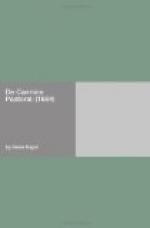That the Thought may be commendable, it must be suitable to the manners; as those must be plain and pure that must be so too: nor must contain any, deep, exquisite, or elaborate fancies: And against this the Italians offend, who continually hunt after smart witty sayings, very foolishly in my opinion; for in the Country, where all things should be full of plainess and simplicity who would paint or endeavor to be gawdy when such appearances would be very disagreeable and offend? Pontanus in this matter hath said very well, The Thought must not be to exquisite and witty, the Comparisons obvious and common, such as the State of Persons and Things require: Yet tho too scrupulous a Curiosity in Ornament ought to be rejected, {35} yet lest the Thought be cold and flat, it must have some quickness of Passion, as in these.
Cruel Alexis can’t my Verses
move?
Hast thou no Pitty? I must dye for
Love_.
And again,
He neither Gods, nor yet my Verse regards.
The Sense must not be long, copious, and continued, For Pastoral is weak, and not able to hold out; but of this more when I come to lay down rules for its Composure: But tho it ought to imitate Comedy in its common way of discourse, yet it must not chose old Comedy for its pattern, for that is too impudent, and licentiously abusive: Let it be free and modest, honest and ingenuous, and that will make it agreeable to the Golden Age.
Let the Expression be plain and easy, but elegant and neat, and the purest which the language will afford; Pontanus upon Virgils Bucolicks gives the very same rule, In Bucolicks the Expression must be humble, nearer common discourse than otherwise, not very Spirituous and vivid, yet such as shows life and strength: Tis certain that Virgil in his Bucolicks useth the same words which Tully did in the Forum or the Senate; and Tityrus beneath his shady Beech speaks as pure and good Latin as Augustus in his Palace, as Modicius in his Apology for Virgil hath excellently observ’d: {36} This rule, ’tis true; Theocritus hath not so strictly follow’d, whose Rustick




